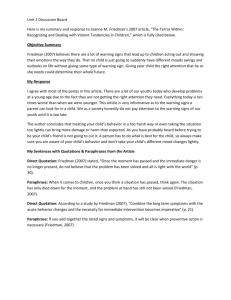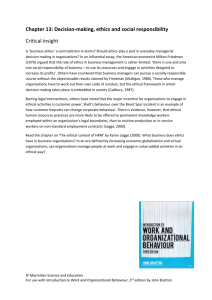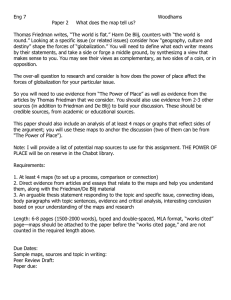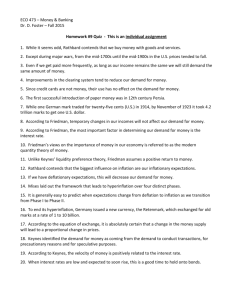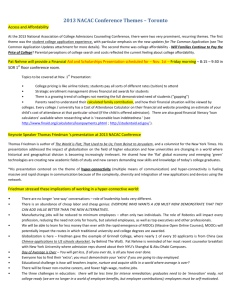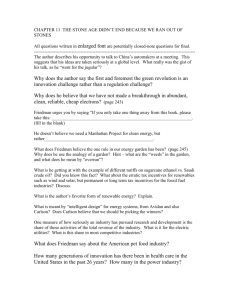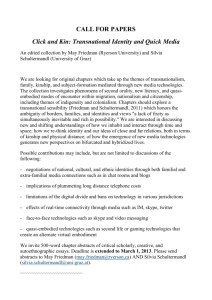P E C S
advertisement
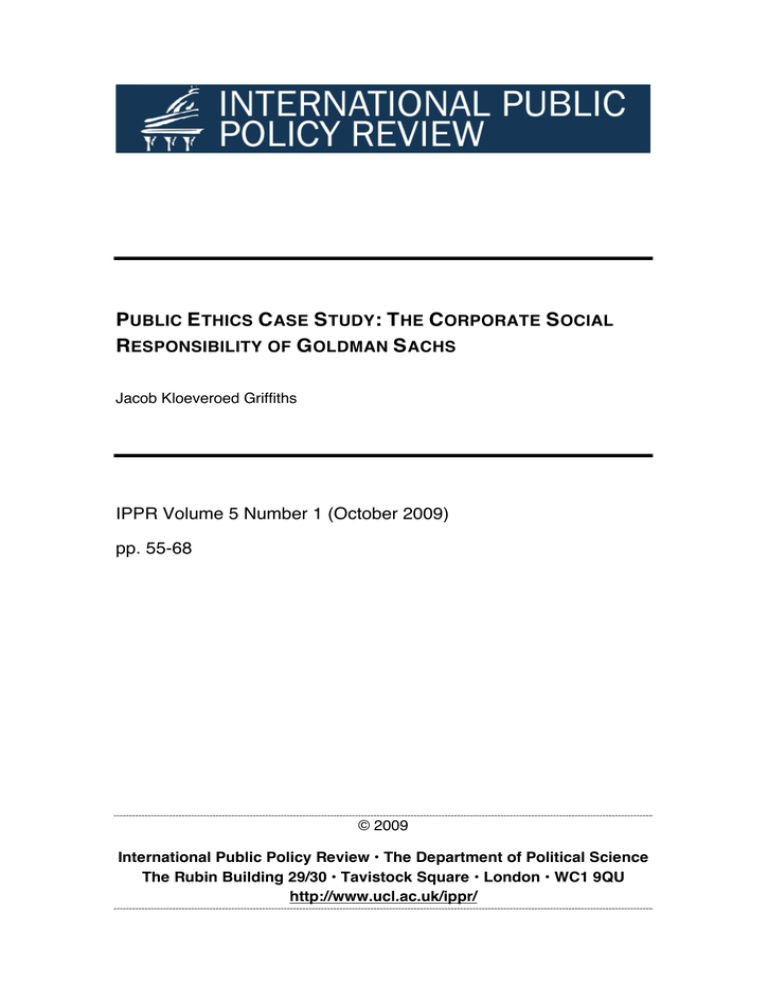
PUBLIC ETHICS CASE STUDY: THE CORPORATE SOCIAL RESPONSIBILITY OF GOLDMAN SACHS Jacob Kloeveroed Griffiths IPPR Volume 5 Number 1 (October 2009) pp. 55-68 © 2009 International Public Policy Review • The Department of Political Science The Rubin Building 29/30 • Tavistock Square • London • WC1 9QU http://www.ucl.ac.uk/ippr/ 33) !"#$%"&#!'"&()*+,(!-)*'(!-.)%$/!$0))))))1))))/'(2)34)"'2)5))1)))'-#',$%))6778)) ) ) Swansborough, R. Test by Fire: The War Presidency of George W. Bush. New York: Palgrave Macmillan, 2008. Walters, J. P., “No Surrender.” National Review. Vol. 56, no. 18 (September 27th, 2004): pp. 41-42. Xenos, N. Cloaked in Virtue. New York: Routledge, 2008. PUBLIC ETHICS CASE STUDY: THE CORPORATE SOCIAL RESPONSIBILITY OF GOLDMAN SACHS Jacob Kloeveroed Griffiths INTRODUCTION In 2008 Goldman Sachs received $10bn of US taxpayer’s money, and at the same time the bank admitted that it had a bonus pot of $2.6bn for its executives.1 Though the concern in this case study is not pay equity, it is important to establish whether the employees at Goldman Sachs can legitimately claim their excessive remuneration in these circumstances. The main purpose of this paper is to examine whether the bank has a moral responsibility to other stakeholders, especially in the light of the burdens which the recession is putting on the rest of society. The theoretical starting point is Friedman’s notion that the only responsibility of business is profit maximisation.2 This idea has formed the basis for a free market regulation paradigm in neoclassical economics and has indeed formed the basis of the politics that has governed globalisation since the 1980s. This system appears to have failed in the financial sector. The essay will argue that the scope of Friedman’s business ethics is too narrow. As the )))))))))))))))))))))))))))))))))))))))))))))))))))))))) 1 J. Robinson, J. Treanor, “Anger over £6.4bn bonus bonanza at four City banks”, The Observer, November 1st, 2009, 2 M. Friedman “The Social Responsibility of Business to increase its Profits”, in T.L. Beauchamp and N.E. Bowie, Ethical Theory and Business (New Jersey: Prentice Hall, 2001). 39) !"#$%"&#!'"&()*+,(!-)*'(!-.)%$/!$0))))))1))))/'(2)34)"'2)5))1)))'-#',$%))6778)) ) ) impact of banks on society is so significant, the range of concerns they need to address is wider than Friedman assumes. Firstly, it will be shown that both theoretically and practically Friedman and the stockholder thesis does not hold, as it does not adequately incorporate externalities and wrongly assumes perfect competition as well as conflicting with virtue ethics. Secondly, the stakeholder thesis will be discussed. While taking a broader approach, this alternative theory could potentially damage private property rights and will be found to be unclear. Thirdly, an attempt will be made to incorporate both private property rights with a wider notion of ethics. The syntheses will be made using Kantian ethics. This will also demonstrate the limitations in Friedman’s work, but allow his concerns for profits to be preserved. However, before the main argument can be advanced, Friedman’s concequentialist position will be outlined with an argument legitimising high remuneration based on freedom. The essay is philosophically committed to disputing Friedman’s position, but also examines practical economic arrangement in society. It is an investigation into Goldman Sachs's moral responsibility, though it must be viewed in the context of a critique of neoclassical economics in the finance crisis of 2008 and public ethics and Corporate Social Responsibility (CSR) generally. AN OUTLINE OF FRIEDMAN’S ARGUMENT REGARDING TO REMUNERATION Friedman’s main argument is that business ethics is solely a relationship between managers and owners. However, popular interpretations of Friedman suggest that his theory is devoid of ethical considerations. These readings reflect a misconception of what Friedman actually says.3 Although he argues the only moral obligation of managers is profit maximisation for owners, he does not condone all behaviour that increases financial returns. Quite explicitly, he places four restrictions on profit seeking: business people must obey the law, follow ethical customs, commit no deception or fraud, and engage in open and free competition.4 For Friedman, social responsibility means pursuing one's interests without interfering with the legally protected freedom of others. )))))))))))))))))))))))))))))))))))))))))))))))))))))))) 3 J. Harvey, “Smith, Friedman, and Self-Interest in Ethical Society”, Business Ethics Quarterly, Vol. 10, no. 3. (2000) 4 Ibid. 3:) !"#$%"&#!'"&()*+,(!-)*'(!-.)%$/!$0))))))1))))/'(2)34)"'2)5))1)))'-#',$%))6778)) ) ) In Baron’s framework of a three way approach to ethics: concequentialist, virtue and Kantian, Friedman should be considered a concequentialist because he believes that by limiting the responsibility of companies the consequence will be a free society5. Though the different natures of the approaches mean they cannot automatically be contrasted, from a virtue ethics position Friedman undermines the inner characteristic of human morality and also from a Kantian perspective it is problematic to justify a policy on the basis that it is morally obligatory because it produces the best outcomes, it is principles that count.6 Paradoxically though, Friedman advocates a free society as the highest principle, whereas in Kantian ethics there could be potential conflicting principles, for instance if the maintaining of a free society required the killing of an opponent of it. The principles of a free society and principle of everyone’s freedom to live would contradict, so Kantian ethics could be criticised because it prescribes no concrete action to get a free society. However, the point of Kantian ethics is that it is concerned with obligatory ends, not obligatory actions.7 On the contrary, Friedman strongly adheres to actconsequentialism; the act of not enforcing more regulation will result in a free society. This sentiment forms the basis for his views on business ethics and ultimately remuneration. His belief in freedom and the responsibility of business being to increase its profits closely resembles, though slightly incorrectly, the interpretation of Smith’s notion of the invisible hand. This maintains that market participants, in pursuit of their self-interests, unknowingly benefit society. Thus the market is a mechanism which regulates itself to produce the best outcome. Businesses should freely do whatever improves their financial position, even though others could be harmed.8 Thereby limited regulation of remuneration is automatically controlled by the market. If enough customers at Goldman Sachs object to high bonuses, an alternative would be provided and they could choose another bank. Friedman is advancing that the public good is optimised through individuals pursuing self-interest in a free market. )))))))))))))))))))))))))))))))))))))))))))))))))))))))) 5 M. Baron, P. Pettit, M. Slote, Three Methods if Ethics. (Oxford: Blackwell Publishing, 2007) Ibid. 7 Ibid. 8 J. Harvey, “Smith, Friedman, and Self-Interest in Ethical Society”, Business Ethics Quarterly, Vol. 10, no. 3. (2000) 6 3;) !"#$%"&#!'"&()*+,(!-)*'(!-.)%$/!$0))))))1))))/'(2)34)"'2)5))1)))'-#',$%))6778)) ) ) This raises two questions. Firstly, whether the free market does benefit everyone? Friedman’s answer would be utilitarian, claiming that most people will benefit.9 The second contestation is whether self-interest is an adequate basis for morality? For Smith and Friedman profit maximising behaviour is not inconsistent with normal ethical values.10 The invisible hand justifies this position. However, for Bowie, concern for one's self-interest is the very heart of behaviour that conflicts with public ethics.11 When selfinterest is narrowly interpreted to mean selfishness that is the case. Though, Friedman does not use the concept of self-interest in this narrow sense. For Smith the overriding principle governing his interpretation of self-interest is justice, while for Friedman the principle is freedom. For both writers, self-interest embodies another-regarding aspect that requires individuals to moderate their actions when others are adversely affected.12 It is this concept of self-interest that Friedman advocates. As the basis for Friedman’s morality is freedom, it allows individuals to pursue their selfinterest. He believes that a free market is the best system to effectively coordinate people without denying them this freedom. The basic problem of social organisation, explains Friedman, is how to coordinate the economic activities of large numbers of people.13 He advocates market mechanisms characterised by voluntary exchanges between individuals. Central planning necessarily involves some degree of coercion by the state. For Friedman regulation is inefficient and immoral, it means everyone loses as there would be less profit in society. MacPherson rejects the argument that political freedom requires capitalism14. However, this misses the main point i.e. the state is to be feared because it represents a concentration of power to which there is no alternative15. The only positive duty of the bank is to act in the best interests of shareholders. At the same time )))))))))))))))))))))))))))))))))))))))))))))))))))))))) 9 N. Barry, The morality of Business Enterprise. (Aberdeen: Aberdeen University Press, 1991) Ibid. 11 T.L. Beauchamp, N.E. Bowie, Ethical Theory and Business (New Jersey: Prentice Hall, 2001) 12 J. Harvey, “Smith, Friedman, and Self-Interest in Ethical Society”, Business Ethics Quarterly, Vol. 10, no. 3. (2000) 13 M. Friedman, Capitalism and Freedom. (Chicago: The University of Chicago Press, 1962) 14 C. MacPherson, “Elegant Tombstones: A Note on Friedman's Freedom”, Canadian Journal of Political Science / Revue canadienne de science politique, Vol. 1, no. 1. (1968) 15 R. Crowley, “A Comment on Professor Macpherson's Interpretation of Friedman's ‘Capitalism and Freedom’”, Canadian Journal of Political Science / Revue canadienne de science politique, Vol. 2, no. 2. (1969) 10 38) !"#$%"&#!'"&()*+,(!-)*'(!-.)%$/!$0))))))1))))/'(2)34)"'2)5))1)))'-#',$%))6778)) ) ) this duty is constrained by negative duties not to cheat, injure, or lie to all stakeholders. In this way the optimal social coordination can be achieved. From the forgoing analysis of Friedman's view of freedom, his position on CSR can be derived. Since actions that impose involuntary harm on others are unacceptable, the bank’s actions must be examined in the context of whether they are voluntary and compatible with the freedom of those affected by their decisions. Friedman says that a social responsibility other than to generate as much profit as possible for business owners is a highly “subversive doctrine”.16 Bankers have a direct responsibility to conduct business in accordance with their desires, which will be to make as much money as possible while conforming to the basic rules of the society. Furthermore, they have no moral obligation to indulge in any philanthropic activity to help other victims of the credit crisis. They lack the expertise to find the best way to help others. So, Friedman has both teleological and deontological reasons for advancing the thesis that bank executives should pursue only profit, and stay away from actions that purport to promote society's interests.17 On teleological grounds, he argues that it may not be possible for bankers to know what constitutes society's interests. On deontological grounds, Friedman believes that the bank’s actions, justified as socially responsible, violate specific duties of those pursuing the actions. For example, unless Goldman Sachs obtains the consent of those affected, they violate the duty not to coerce others. If bank executives do not act in the interest of their employer, then they are coercing them into financing a project that the owners might not want. The executive would be spending someone else's money for a general social interest. Business people who claim they have an obligation to desirable social ends are unwittingly puppets of intellectual forces that have been undermining the basis for a free society.18 Thus, the setting of wages is a decision for shareholders, and any other’s involvement is a violation of their property rights. )))))))))))))))))))))))))))))))))))))))))))))))))))))))) 16 M. Friedman, “The Social Responsibility of Business to increase its Profits”, in T.L. Beauchamp, N.E. Bowie, Ethical Theory and Business. (New Jersey: Prentice Hall, 2001), pp. 401 17 J. Harvey, “Smith, Friedman, and Self-Interest in Ethical Society”, Business Ethics Quarterly, Vol. 10, no. 3. (2000) 18 M. Friedman, “The Social Responsibility of Business to increase its Profits”, in T.L. Beauchamp, N.E. Bowie, Ethical Theory and Business. (New Jersey: Prentice Hall, 2001) 97) !"#$%"&#!'"&()*+,(!-)*'(!-.)%$/!$0))))))1))))/'(2)34)"'2)5))1)))'-#',$%))6778)) ) ) Friedman’s free market view of CSR legitimates high wages if they are the result of a free exchange. The owners of the bank have a right to decide the amount of remuneration. The reason for this is that in a free society an executive is an employee of the owners of the business. Distorting this relationship is damaging and immoral, because it results in lower profits. The price setting mechanism of the free market determines the price someone gets for their labour. Walzer argues that there are problems with allowing markets to dictate wages because of the inequity of power within the market19. However, arguably even from a Friedmanite position the bonuses at Goldman Sachs are not justified. As its market value has been halved, employees appear not to have maximised profits.20 Though, ultimately this is a decision for bank investors to evaluate. Walzer identifies the marketplace as a sphere of justice. Within a certain sphere of justice certain rules apply21. Similarly, Marx claimed that it was nonsensical to criticise capitalism for being unjust because justice was itself a capitalist term.22 The mode of production creates its own moral rules. Thus, an actor in the market knows the mechanism and is entitled to what he gets, but that does not necessarily correspond to any other evaluation of how significant the job is, as demonstrated by Nozick’s Chamberlain argument. So, in a market system, our remuneration or the price of our labour is our desert. Walzer argues this is to misunderstand the concept of desert, indeed timing and luck are decisive, and business is a chancy business.23 The remuneration of bank managers can therefore be justified by its free market context. The bonuses are gained in a free market. As Locke argued, labour itself creates the foundation for property rights24. So when accepting the premises of a capitalist economy, as Friedman does, bank managers can legitimately claim their remuneration. 1. CRITIQUE OF THE STOCKHOLDER THESIS )))))))))))))))))))))))))))))))))))))))))))))))))))))))) 19 M. Walzer, Spheres of Justice. (Oxford: Blackwell Publishing, 1983) S. Duke, “Goldman Sachs ready to hand out £7bn salary and bonus package”, The Daily Mail, 30th October, 2008. 21 M. Walzer, Spheres of Justice. (Oxford: Blackwell Publishing, 1983) 22 K. Marx, Capital. (Oxford: Oxford University Press, 1999) 23 M. Walzer, Spheres of Justice. (Oxford: Blackwell Publishing, 1983) 24 J. Locke, Second Treatise of Government. (Indianapolis: Hacket, 1980) 20 95) !"#$%"&#!'"&()*+,(!-)*'(!-.)%$/!$0))))))1))))/'(2)34)"'2)5))1)))'-#',$%))6778)) ) ) Friedman is defining a very limited circumstance for applying morality to business decisions. His business ethics state that the shareholder’s interests are superior to other considerations. There appears to be problems with this neoclassical view. Neither the bank’s managers nor owners have any obligation to take responsibility for anything other than running a profitable bank. However, banks rely on investors which are technically everyone who holds an account with them, though some investors are more significant than others. Goldman Sachs has also been bailed out with taxpayer funds due to their important role. This raises problems with Friedman’s argument. Using tax payers’ money seems to imply a collective ownership, though technically the state is not an owner. Nonetheless, the system Friedman has advocated seems to have failed. There appears to be wider accountability for firm’s actions than just to stockholders. Friedman does not only assume the opposite, but maintains that accountability is sustained through selfregulation in the market.25 His theory is strongly grounded in a neoclassical framework of economic belief. Central to this are the concepts of externalities, perfect completion and an overarching assumption of market self-regulation and, finally, arrangements relating to the role of management. The aforementioned concepts will now be discussed. Firstly, Friedman dismisses other parties that do not fit into his framework as externalities. An externality says Friedman, is the effect of a transaction on a third party who has not consented to or played any role in the carrying out of that transaction.26 Accordingly, he acknowledges that some restrictions on our freedom are necessary to avoid other, still worse, restrictions.27 However, control of wages would not count as such a condition. So when taxpayer’s money is used to pay for bonuses instead of, for instance cheaper loans, it is justified by the fact that the democratic US government technically does not own Goldman Sachs and the bank is best suited to running itself. Friedman distinguishes between harm caused by external effects, which he opposes, and the personal consequences of decisions individuals make when they freely enter into risky transactions, such as the remuneration at Goldman Sachs, which he accepts as )))))))))))))))))))))))))))))))))))))))))))))))))))))))) 25 T.L. Beauchamp, N.E. Bowie, Ethical Theory and Business (New Jersey: Prentice Hall, 2001) J. Bakan, The Corporation (London: Constable, 2004) 27 M. Friedman, “The Social Responsibility of Business to increase its Profits”, in T.L. Beauchamp, N.E. Bowie, Ethical Theory and Business (New Jersey: Prentice Hall, 2001) 26 96) !"#$%"&#!'"&()*+,(!-)*'(!-.)%$/!$0))))))1))))/'(2)34)"'2)5))1)))'-#',$%))6778)) ) ) necessary in a free society. According to Friedman, the former reduces individual freedoms while the latter does not.28 However, the bank seems to have pursued its selfinterest so ruthlessly that its damaging effects cannot simply be disregarded as externalities, or “other people’s problems” as Bakan puts it29. It seems that most members of society within Friedman’s framework cannot be considered outside his limits of people who have a right to decide and moral worth. This becomes especially apparent due to the asymmetry of power between individuals and large corporations. It is difficult for them to be compensated. Today there are grounds to claim that big business is oligopolistic. Taxpayers and others stakeholder have no real power over banks. Therefore it seems like the neoclassical axiom of perfect competition, is incorrect. The absence of perfect competition is a problem with regards to Friedman’s theory because of the banks’ power relation to external parties seems unbalanced. Secondly, aspects relating to a corporation's legal arrangements can create problems. Friedman makes it clear that his argument applies only to companies in which the decision managers are not the owners of the company30, as is the case in Goldman Sachs. Bank executives may feel they have personal obligations to, for instance their families, consciences, religion, et cetera31. However, in these respects they are acting as principles, not as agents. The banker is using his own money, time or energy, not that which he is contracted to by his employers. If there are social responsibilities they concern individuals not business. Corporations, even though claimed to be an artificial legal person, cannot have responsibility, according to Friedman32. However, dichotomising a person into a moral agent and an amoral professional can seem strange, especially with regards to virtue ethics. Also, it can be contended that executives have a conscience and it is their morality that should be applied to business. As Thompson33 points out, there is a tendency to make individual ethics the only kind of ethics in public life. It seems )))))))))))))))))))))))))))))))))))))))))))))))))))))))) 28 J. Harvey, “Smith, Friedman, and Self-Interest in Ethical Society”, Business Ethics Quarterly, Vol. 10, no. 3. (2000) 29 J. Bakan, The Corporation (London: Constable, 2004) 30 J. Harvey, “Interest in Ethical Society”, Business Ethics Quarterly, Vol. 10, no. 3. (2000) 31 M. Friedman, “The Social Responsibility of Business to increase its Profits”, in T.L. Beauchamp, N.E. Bowie, Ethical Theory and Business (New Jersey: Prentice Hall, 2001) 32 Ibid. 33 D. Thompson, Restoring Responsibility: Ethics in Government, Business and Healthcare (Cambridge: Cambridge University Press, 2005) 9<) !"#$%"&#!'"&()*+,(!-)*'(!-.)%$/!$0))))))1))))/'(2)34)"'2)5))1)))'-#',$%))6778)) ) ) individual relations such as within families for instance which is face to face, are different moral principles than institutional ethics which governs relations between individuals as members of organisations and as citizens. According to Thomson individual ethics, like the ones Friedman discusses, dominate institutional ethics. He calls this privatisation of business ethics. One way of regenerating institutional ethics is to treat the corporation itself as a moral equivalent of an individual, as is the case legally34. As Friedman feels that a business has no moral conscience, it has no moral obligation and is not a socially responsible institution. Individuals have responsibility. Though, Thompson argues that less emphasis should be on the moral character of the individual manager, but the structure in which he operates. Friedman’s focus is both too individualistic and does not appreciate the inner characteristics of human morality. 2. CRITIQUE OF THE STAKEHOLDER THESIS For the reasons mentioned above the stockholder thesis does not to hold and appears to be too narrow. The bonuses at Goldman Sachs exemplify this. In the light of the financial crisis of 2008, they are not completely using their government funds to aid society. Alternatively, the stakeholder thesis states that business should take into account all groups affected by a firm’s decisions. Traditionally six stakeholders have been identified: stockholders, employees, customers, managers, suppliers and the local community.35 These groups are also discussed in Friedman’s theory, but their moral obligations are something which must be derived from their view of a liberal society. As people who have dignity and rights that must be respected, their status should be emphasised to a greater extent,36 it seems that their interests have been unfairly subordinated. Stakeholder theory also acknowledges the importance of profit maximising, but questions whether the profits should go to the investors and managers instead of other groups. However, in Thompson’s institutional form of business ethics, he appeals to )))))))))))))))))))))))))))))))))))))))))))))))))))))))) 34 D. Thompson, Restoring Responsibility: Ethics in Government, Business and Healthcare (Cambridge: Cambridge University Press, 2005) 35 T.L. Beauchamp, N.E. Bowie, Ethical Theory and Business (New Jersey: Prentice Hall, 2001) 36 J. Dienhart, E. Freeman, Business Institutions and Ethics: a text with cases and readings (London: Oxford University Press, 2000) !"#$%"&#!'"&()*+,(!-)*'(!-.)%$/!$0))))))1))))/'(2)34)"'2)5))1)))'-#',$%))6778)) 9=) ) ) principles that are shared with all fellow citizens, and not just for the pursuit of profit. Thus he proposes, in his view, a more democratic solution so that all interests of society can be taken into account.37 Depersonalising ethics leads in Thompson’s view to the Friedmanite system where managers only have responsibility to maximise profits. This neglects the nature of public ethics. It seems correct to assume that a democratic outcome would not be such high remuneration for the bankers at Goldman Sachs. As Walzer notes, the free market system is not founded on the one person one vote principle; sectorial interest of a few wealthy parties seems to dictate.38 Thompson wants a balance between profit and morality to be the aim for all business ethics that can claim to be the ethics for all citizens. However, what sort of regulatory system he wants is unclear. Potentially it could limit the property rights Friedman is correct in determining. In a liberal society, taking the returns from investors would be a violation of their property rights. Stakeholder theory is not as developed as stockholder, so it appears vague. The rights and responsibilities of each stakeholder are not distinct. Friedman clearly defines manager’s obligations. They have legal obligations to the stockholders.39 In the stakeholder thesis it is impossible to discover the balance between profits and responsibility and the relationship between the different stakeholders. So the thesis appears vague and could potentially undermine property rights. 3. BROADENING MORAL APPLICATION TO BUSINESS IN LIGHT OF THE FINANCIAL CRISES The financial crises illustrates that a broader approach to business ethics is required. There appear to be problems with both stockholder and stakeholder notions of CSR. On the one hand Friedman and his followers define a too limited scope of morality, while on )))))))))))))))))))))))))))))))))))))))))))))))))))))))) 37 D. Thompson, Restoring Responsibility: Ethics in Government, Business and Healthcare (Cambridge: Cambridge University Press, 2005) 38 Walzer, M. Spheres of Justice. Oxford: Blackwell Publishing 1983 39 M. Friedman, “The Social Responsibility of Business to increase its Profits”, in T.L. Beauchamp, N.E. Bowie, Ethical Theory and Business (New Jersey: Prentice Hall, 2001) 93) !"#$%"&#!'"&()*+,(!-)*'(!-.)%$/!$0))))))1))))/'(2)34)"'2)5))1)))'-#',$%))6778)) ) ) the other hand it emerges that stakeholder theory could threaten property rights and actor’s responsibility seems difficult to define. As already established, Friedman is correct in his analysis of property rights, but at the same time he has a limited scope of morality, but it will now be shown how Kantian ethics can present a philosophical solution to this problem. Kant is able to include elements with regards to, firstly, externalities and, secondly, the problems concerning the manager’s legal and moral obligations that Friedman and neoclassical economics neglect. Kantian ethics are not only broader, but transcend the problems in Friedman’s work. For Kant, CSR would not be seen as a positive externality that results from the modern corporation’s pursuit of profit, but a factor which carries moral worth in itself. CSR should be undertaken for genuine and altruistic reasons, rather than merely a cynical gussied up bid for good favour. However, many stockholder theorists put shareholders and their returns at the centre of business decisions, yet hold CSR as important for the modern corporation. They would have no moral problem, for example, with the idea that ethics is good business.40 To pay managers lower wages than other companies might make it look like the company is taking responsibility. However, if it is done purely for the sake of increased profits it would not adhere to a higher moral principle in Kantian ethics and Thompson would call this personalising ethics. If the aim is to strengthen the bank’s position in the market, the outcome is still good but would not adhere to Kantian ethics. At the same time, it is important to clarify that Kant’s categorical imperative has often been misinterpreted to mean simply not to treat others as a means to an end. He actually states one should not exclusively treat others as means to ends.41 Therefore it seems possible to include Friedman’s narrow business ethics into Kant’s wide moral philosophy. Firstly, with regard to Friedman treating stakeholders as externalities, it is possible for managers to do the right thing motivated by both profits and virtuous moral principles. For instance, to show restraint in order to generate profit, and to do so for the reason that it is a right course of action in the finance crises, are both acceptable in Kant’s theory. )))))))))))))))))))))))))))))))))))))))))))))))))))))))) 40 D. Thompson, Restoring Responsibility: Ethics in Government, Business and Healthcare (Cambridge: Cambridge University Press, 2005) 41 T.L. Beauchamp, N.E. Bowie, Ethical Theory and Business (New Jersey: Prentice Hall, 2001) 99) !"#$%"&#!'"&()*+,(!-)*'(!-.)%$/!$0))))))1))))/'(2)34)"'2)5))1)))'-#',$%))6778)) ) ) Friedman would call the latter motive “window dressing”, bordering on fraud,42 and Kant would reject the idea of action purely on profit maximising grounds. At the same time he would allow a profit-seeking mentality, as long as it was not the sole factor. Although the motive for the action is different, there seems no contradiction in assuming that doing the right thing, cutting bonuses, could be the same as doing the profitable thing. Since Friedman wrote Capitalism and Freedom in 1962 there have been many changes. The maintenance of a good corporate image is important to profitability; therefore acts of CSR must be firmly on the agenda. It is plausible that it would be good business for the bank to decrease bonuses and instead provide cheaper loans that would benefit everyone. Property rights would be intact and if this was done for the sake of helping society, it would adhere to Kantian ethics. Thus, Goldman Sachs can afford, if their morality is so inclined, to incorporate society’s interest into business decisions. Secondly, regarding the dichotomy of the individual agent in Friedman’s thesis, this can be overcome by clarifying a common misunderstanding in Kant’s thesis. Some think that Kant emphasised universal obligations over particular ones. An obligation such as keeping a promise is universal, whereas the obligation to grade students fairly is one that falls only on teachers.43 Similarly, the managerial obligation to use the funds of an investor to create profit is an obligation that falls only on the manager, whereas the manager’s obligations to for instance his local community or family are universalistic. Thereby the bank managers theoretically should, assuming it is not contradictory, increase profits specifically at work, but aid society generally. Though principles may conflict in Kantian ethics, it does none the less seem possible to unite Friedman’s main concerns with a broader thesis in ethics. Friedman’s goals of a free society would still remain intact. CONCLUSION As the outlining argument explains, banker’s high remuneration alone is not in itself a problem within Friedman’s theory because they are justified by market forces. Though, the bankers at Goldman Sachs cannot legitimate their bonuses as their job of profit )))))))))))))))))))))))))))))))))))))))))))))))))))))))) 42 M. Friedman, “The Social Responsibility of Business to increase its Profits”, in T.L. Beauchamp, N.E. Bowie, Ethical Theory and Business (New Jersey: Prentice Hall, 2001) 43 T.L. Beauchamp, N.E. Bowie, Ethical Theory and Business (New Jersey: Prentice Hall, 2001) 9:) !"#$%"&#!'"&()*+,(!-)*'(!-.)%$/!$0))))))1))))/'(2)34)"'2)5))1)))'-#',$%))6778)) ) ) maximisation has arguably been poor. It appears free market mechanisms have not succeeded in the finance sector. Markets seem not to be self-regulating; therefore Friedman’s neoclassical assumptions emerge as incorrect. The main question can now be answered with a fair degree of certainty. Goldman Sachs has a wider social responsibility than Friedman postulates. Firstly, Friedman’s stockholder thesis and neoclassical economics fails to incorporate externalities, wrongly axiomates perfect competition and dichotomises executives’ personalities. Secondly, the stakeholder theory does take into account a wider range of concerns, but it was found to be vague and potentially neglects property rights of shareholders. Thirdly, it has been demonstrated that Friedman need not limit his scope of morality, even though his main concern is preserving shareholders rights over their profits. This is because virtuous business has become more profitable business since Friedman wrote his theory. Firstly, concerning externalities, Goldman Sachs’ wish to generate profits can be combined with moral regard for other stakeholders. Nearly all corporate philanthropy seems to be motivated by publicity44. That would not necessarily be a problem for Kant, as long as there are other ethical motives. Secondly, with regards to the dichotomy of the moral agent in Friedman’s theory, this can be overcome by Kant’s distinction between special and universal moral principles. The bank could accept the intrinsic moral worth of other factors and maximise profits. Thereby Friedman’s limited view of CSR as purely an issue between mangers and owner can be broadened. REFERENCES Baron, M., Pettit, P., Slote, M. Three Methods if Ethics. Oxford: Blackwell Publishing, 2007. Bakan, J. The Corporation. London: Constable, 2004. Barry, N. The Morality of Business Enterprise. Aberdeen: Aberdeen University Press, 1991. )))))))))))))))))))))))))))))))))))))))))))))))))))))))) 44 Ibid. 9;) !"#$%"&#!'"&()*+,(!-)*'(!-.)%$/!$0))))))1))))/'(2)34)"'2)5))1)))'-#',$%))6778)) ) ) Beauchamp, T.L., Bowie, N.E. Ethical Theory and Business. New Jersey: Prentice Hall, 2001. Crowley, R. “A Comment on Professor Macpherson's Interpretation of Friedman's ‘Capitalism and Freedom’”, Canadian Journal of Political Science / Revue canadienne de science politique, Vol. 2, no. 2 (1969). Dienhart J., Freeman, E. Business Institutions and Ethics: a text with cases and readings. London: Oxford University Press, 2000. Duke, S. “Goldman Sachs ready to hand out £7bn salary and bonus package”, The Daily Mail, 3rd October, 2008, URL: http://www.dailymail.co.uk/news/worldnews/article-1081624/Goldman-Sachsready-hand-7BILLION-salary-bonus-package--6bn-bail-out.html Accessed 11th January, 2009. Friedman, M. “The Social Responsibility of Business to increase its Profits”, in Beauchamp, T.L., Bowie, N.E., Ethical Theory and Business. New Jersey: Prentice Hall, 2001. Friedman, M. Capitalism and Freedom. Chicago: The University of Chicago Press, 1962. Harvey, J. “Smith, Friedman, and Self-Interest in Ethical Society”, Business Ethics Quarterly, Vol. 10, no. 3. (2000). Locke, J. Second Treatise of Government. Indianapolis: Hacket, 1980. MacPherson, C. Elegant Tombstones: A Note on Friedman's Freedom. Canadian Journal of Political Science / Revue canadienne de science politique, Vol. 1, No. 1. 1968 Marx, K. Capital. Oxford: Oxford University Press, 1999. Thompson, D. Restoring Responsibility: Ethics in Government, Business and Healthcare Cambridge: Cambridge University Press, 2005. Robinson, J. Treanor, J. “Anger over £6.4bn bonus bonanza at four City banks”, The Observer, 21st December, http://www.guardian.co.uk/business/2008/dec/21/ 2009, executive-salaries-bonuses- city-finance Accessed 11th January, 2009. Walzer, M. Spheres of Justice. Oxford: Blackwell Publishing, 1983. ) URL:
